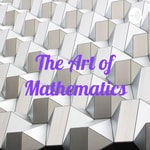The Art of Mathematics – Détails, épisodes et analyse
Détails du podcast
Informations techniques et générales issues du flux RSS du podcast.


Classements récents
Dernières positions dans les classements Apple Podcasts et Spotify.
Apple Podcasts
🇨🇦 Canada - mathematics
10/08/2025#46🇬🇧 Grande Bretagne - mathematics
10/08/2025#35🇩🇪 Allemagne - mathematics
10/08/2025#18🇺🇸 États-Unis - mathematics
10/08/2025#7🇫🇷 France - mathematics
10/08/2025#32🇨🇦 Canada - mathematics
09/08/2025#46🇬🇧 Grande Bretagne - mathematics
09/08/2025#35🇩🇪 Allemagne - mathematics
09/08/2025#16🇺🇸 États-Unis - mathematics
09/08/2025#7🇫🇷 France - mathematics
09/08/2025#30
Spotify
Aucun classement récent disponible
Liens partagés entre épisodes et podcasts
Liens présents dans les descriptions d'épisodes et autres podcasts les utilisant également.
See allQualité et score du flux RSS
Évaluation technique de la qualité et de la structure du flux RSS.
See allScore global : 43%
Historique des publications
Répartition mensuelle des publications d'épisodes au fil des années.
Turning Math-Hating Prisoners into Mathematicians
mercredi 28 août 2024 • Durée 22:14
Kate Pearce, a post-doc researcher at UT Austin, talks about her experience teaching math in a women's prison. Her remedial college algebra students came in with negative experience in math, so she devised ways to make the topics new. The elective class called, coincidentally, The Art of Mathematics, explored parallels between math and art, infinity, algorithms, formalism, randomness and more. The students learned to think like mathematicians and gained confidence in their abilities in abstract problem solving.
Stop Overselling Mathematics
mercredi 24 juillet 2024 • Durée 17:20
Alon Amit, prolific Quora math answerer, argues that an honest representation of mathematical ideas is enough to spark interest in math. It's not necessary to exaggerate the role of math; the golden ratio does not drive the stock market, the solution of the Riemann hypothesis will not kill cryptography, and Grothendieck did not advance robotics. History and seeing the thought process and the struggle behind the tight finished proof are ways to make math compelling.
Gödel's Incompleteness, Fundamental Truths, and Reasoning in Math and Law
mercredi 25 octobre 2023 • Durée 22:07
Lawyer Lee Kraftchick discusses the search for truth and basic principles in the legal community and the surprising parallels and similarities with the same search in the math community. Mathematical and legal arguments follow a similar structure. Even the backwards way an argument is created is the same.
Math and the Law
mercredi 27 septembre 2023 • Durée 20:22
Lee Kraftchick, a lawyer with a math degree, discusses some of the surprising parallels between the fields. Math is used directly to make statistical arguments to rule out random chance as a cause. He gives examples from his experience in redistricting and affirmative action. Math is used indirectly in legal reasoning from what is known to justified conclusions. Math reasoning and legal reasoning are remarkably similar. He invites lawyers to set aside the usual "lawyers aren't good at math" stereotype and see the beauty of the subject.
Fabulous Fibonacci
mercredi 23 août 2023 • Durée 20:32
Jeanne Lazzarini looks for math in the real world and finds the Fibonacci sequence and the closely related Golden Ratio. These appear as we examine plants, bees, rabbits, flowers, fruit, and the human body. These natural patterns and pleasing symmetries find their way into the arts. Does nature understand math better than we do?
Vowels and Sounds and a Little Calculus
mercredi 26 juillet 2023 • Durée 11:38
Brian Katz, from California State University Long Beach, invites us to explore the various layers of ordinary sounds, informed by a little calculus. The limited frequencies that come out of the wave equation are what separates sounds that communicate (voice, music) from noise. These higher notes are in the sound itself and you can hear them (but alas, not on this compressed podcast audio). Brian has provided links to hear these layers of pitches at theartofmathematicspodcast.com
The Hat: A Newly Discovered "Ein-stein" Tessellation Tile
mercredi 28 juin 2023 • Durée 13:41
Jeanne Lazzarini, who has visited us before to talk about tessellations, discusses a new mathematical discovery that even earned a mention on Jimmy Kimmel. It's a shape that can be used to fill the plane with no gaps and no overlaps and, most remarkably, no repeating patterns.
Interfacing Music and Mathematics
mercredi 24 mai 2023 • Durée 21:12
Lawrence Udeigwe, associate professor of mathematics at Manhattan College and an MLK Visiting Associate Professor in Brain and Cognitive Sciences at MIT, is both a mathematician and a musician. We discuss his recent opinion piece in the Notices of the American Mathematical Society calling for "A Case for More Engagement" between the two areas, and even get a little "Misty." He's working on music that both jazz and math folks will enjoy. We talk about "hearing" math in jazz and the life of a mathematician among neuroscientists.
Fourier Analysis: It's Not Just for Differential Equations
mercredi 26 avril 2023 • Durée 18:23
Joseph Bennish returns to dig into the math behind the Fourier Analysis we discussed last time. Specifically, it allows us to express any function in terms of sines and cosines. Fourier analysis appears in nature--our eyes and ears do it. It's used to study the distribution of primes, build JPEG files, read the structure of complicated molecules and more.
Joseph Fourier, the Heat Equation and the Age of the Earth
mercredi 22 mars 2023 • Durée 17:32
Joseph Bennish, Professor Emeritus of California State University, Long Beach, joins us for an excursion into physics and some of the mathematics it inspired. Joseph Fourier straddled mathematics and physics. Here we focus on his heat equation, based on partial differential equations. Partial differential equations have broad applications. Fourier developed not only the heat equation but also a way to solve it. This equation was used to answer, among other questions, the issue of the age of the earth. Was the earth too young to make Darwin's theory credible?